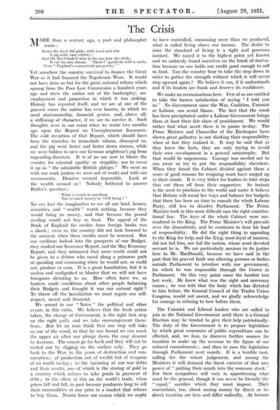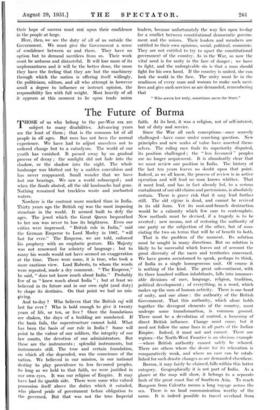The Crisis
MORE than a century ago, a poet and philosopher wrote : Down the river did glide, with wind and tide
A pig with vast celerity ; And the Devil look'd wise as he saw how the while.
It cut its own throat. There ! ' quoth he with a smile, 'Goes "England's commercial prosperity."'
Yet somehow the country survived to finance the Great War as it had financed the Napoleonic Wars. It would not have done so but for the great national reform which sprang from the Poor Law Commission a hundred years ago and drew the nation out of the bankruptcy, un- employment and pauperism in which it was sinking. History has repeated itself, and we are at one of the gravest crises the nation has ever known, in which we need statesmanship, financial genius, and, above all, a stiffening of character, if we are to survive it. Such thoughts were in our mind when we wrote two months ago upon the Report on Unemployment Insurance. The cold reception of that Report, which should have been the stimulus to immediate reform, dismayed us, and the pig went faster and faster down stream, while we were bidden to save our German neighbour's pig from impending disasters. It is of no use now to blame the country for criminal apathy or stupidity, nor to cover it up as "the admirable British phlegm." We went on with our work (unless we were out of work) and with our amusements. Disaster seemed impossible. Look at the wealth around us ! Nobody bothered to answer Butler's question :
"What is worth in anything But so much money as 'twill bring ? "
No one had the imagination to see all our land, houses, securities, and " wealth " worth nothing, because they would bring no money, and that because the pound sterling would not buy us food. The appeal of the Bank of England for credits from foreign banks was a shock ; even so, the country did not look forward to the moment when these credits must be renewed. But our creditors looked into the prospects of' our Budget, they studied our Insurance Report, and the May Economy Report, and they intimated that more credit could not be given to a debtor who raced along a primrose path of spending and consuming when he would not, or could not, produce or earn. It is a great humiliation, but it is useless and undignified to bluster that we will not have foreigners dictating to us. How often have we, as lenders, made conditions about other people balancing their Budgets and thought it was our natural right ? To throw off the humiliation we must regain our self- respect, moral and financial.
We record in our " Notes " the political and other events in this crisis. We believe that the fresh action taken, the change of Government, is the right first step on the right path, and we take encouragement there- from. But let no man think that one step will take us out of the wood, or that by one bound we can reach the upper air after our plunge down the easy descent to Avernus. The causes go far back and they will not be rooted out by digging on the surface only. They go back to the War, to the years of destruction and con- sumption; of production not of wealth but of weapons of no worth to-day ; to the incurring of our war debts and their results, one of which is the storing of gold in a country which refuses to take goods in payment of debt ; to the effect of this on the world's trade, when prices fall and fall, in part because producers long to sell their commodities at any, price in a market that refuses to buy them. Nearer home are causes which we ought to have controlled, consuming more than we produced, what is called living above our income. The desire to raise the standard of living is a right and generous instinct. We raised it to the highest point yet known and we suddenly found ourselves on the brink of ,staiva- tion because no one holds our credit good enough to sell us food. Can the country bear to take the step down in order to gather the strength without which it will never step upward again ? We believe it can, if it understands and if its leaders are frank and deserve its confidence-.
We make no recriminations here. Few of us are entitled to take the barren satisfaction of saying "I told you so." No Government since the War, Coalition, Unionist or Labour, can avoid blame. The fact that the crash has been precipitated under a Labour Government brings them at least their fair share of punishment. We would rather find what merit there is to praise to-day. The Prime Minister and Chancellor of the Exchequer have shown great gallantry in not shirking their responsibility when at last they realized it. It may be said that as they knew the facts, they are only trying to avoid their own envelopment in a general catastrophe. But that would be ungenerous. Courage was needed not to run away or try to put the responsibility elsewhere. When they found the Cabinet divided against them a score of good reasons for resigning must have surged up to their minds. It is very bitter for leaders to take steps that cut them off from their supporters. So instant is the need to proclaim to the world and make it believe that Britain will mend her ways and balance her budgets that there has been no time to consult the whole Labour Party, still less to dissolve Parliament. The Prime Minister took in this most difficult case the right constitu- tional line. The keys of the whole Cabinet were sur- rendered to the King. The Prime Minister's will prevails over the dissentients, and he continues to bear his load of responsibility. He did the right thing in appealing to the King for help, and the King, most loyal of masters, did not fail him, nor fail the nation, whose most devoted servant he is. We are particularly anxious to do justice here to Mr. MacDonald, because we have said in the past that his gravest fault was allowing persons or bodies outside Parliament to interfere with our government, for which he was responsible through the Crown in Parliament. On this very point came the hardest test last week. He knew what was the right and necessary course ; he was told that the body which has dictated to him before, the General Council of the Trades Union Congress, would not assent, and we gladly acknowledge his courage in refusing to bow before them.
The Unionist and Liberal leaders who are called to join in the National Government until there is a General Election may be trusted to give their help patriotically. The duty of the Government is to prepare legislation by which great economies of public expenditure can be effected, and, we fear, to discover further sources for taxation to make up the revenue to the figure of our reduced commitments ; and then to pass the legislation through Parliament next month. It is a terrible task, calling for the wisest judgement, and among the Ministers it will demand the finest exercise of that rare power of "putting their minds into the common stock." For their sympathies will vary in apportioning what must be the general, though it can never be literally the "equal," sacrifice which they must impose. Their convictions, too, about raising money by direct or in- direct taxation are fi,rm and differ radically. •At bottom their hope of success must rest upon their confidence in the people at large.
Here, then, we see the duty of all of us outside the Government. We must give the Government a sense of confidence between us and them. They have no option but to demand sacrifices from us. Their work must be arduous and distasteful. It will lose more of its unpleasantness and it will be the better done, the more they have the feeling that they are but the machinery through which the nation is offering itself willingly. On politicians, editors, and all who attempt in however small a degree to influence or instruct opinion, the responsibility lies with full weight. Most heavily of all it appears at this moment to lie upon trade union leaders, because unfortunately the way lies open to-day for a conflict between constitutional democratic govern- ment and the unions. Their leaders and members are entitled to their own opinions, social, political, economic. They are not entitled to try to upset the constitutional government of the country. As in the War, so now the vital need is for unity in the face of danger ; we have to fight, and the unforgivable sin is that a man should fight for his own hand. If the country is united, she can look the world in the face. The unity must lie in the readiness of every man and woman to make such sacri- fices and give such services as are demanded, remembering that
"Who serves her truly, sometimes saves the State."



























 Previous page
Previous page